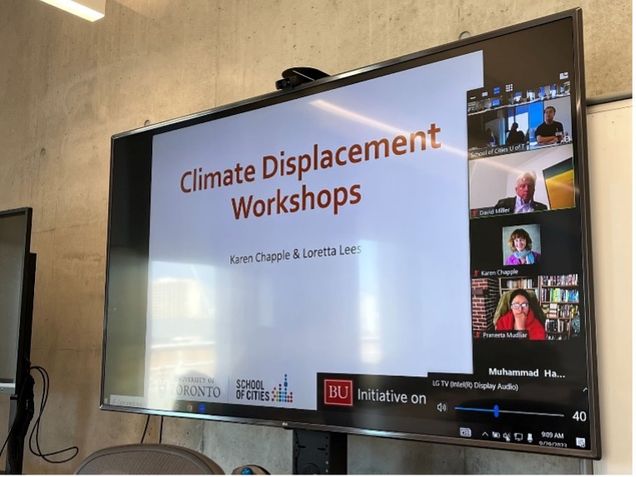School of Cities, University of Toronto and Initiative on Cities, Boston University hold first SSHRC-funded workshop on research, policy and practice in relation to Climate Displacement and Cities
On September 28th, Boston University’s Initiative on Cities and the University of Toronto’s School of Cities held the first of three workshops on climate displacement in Toronto, Canada. David Miller of C40 Cities, who also sits on the IOC’s External Advisory Board, delivered an excellent keynote discussing global mayoral thoughts on climate displacement and outlining their strategies to deal with the issue, drawing on cases from several different cities across the globe. Marina Lazetic, Director of Programs from BU’s Center for Forced Displacement (CfD), presented CfD research on climate-related migrations and displacement, and David Demeritt, a new BU Professor in Earth and Environment, who co-directs the Leverhulme Wildfire Centre in the UK, attended and provided his expertise on environmental risk.

Workshop 1 assessed the state-of-the-art thinking on Climate Displacement across disciplines. Panel 1 focused on Theorizing Climate Mobilities and Displacements and included predictive modeling from LISER in Luxembourg, the Karachi Urban Lab’s work on climate risk and displacement in Pakistan, and research from Canada. Panel 2 focused on Staying in Place, with talks on the climate-migration nexus, hazard risk communication, and resilient livelihoods as an intervention in Southeast Asia.

Some of the issues discussed included:
- Are people moving more as a result of climate change? If yes – where to? Is it being exaggerated if they stay in place – where and why?
- How does climate change impact mobility and immobility in and out of cities?
- What do we know? What research gaps do we need to fill to propose and advocate for better policies that help the most impacted communities? What best practices are emerging?

As urban institutes, we primarily focused on impacts in and on cities around the world: climate displacement’s relationship with urbanization in the so-called ‘global south;’ in its relationship to gentrification, e.g., newly merging work on green and climate gentrification; urban governance issues; its nexus with cities already experiencing a housing crisis; etc.
The workshop demonstrated that while economic models might predict large movements of people due to climate change in and around the equator, migration is not a given. Place attachment, including community attachment, can play a huge role in someone’s desire to move or stay despite increasing climate risks. We identified binaries that need unpicking further, e.g., staying/receiving, mobility/immobility, displacement/emplacement. We decided to zoom in on, for example, micro-displacement concerning microclimates, the complications of muddy data, disaster risk management triggering displacement, etc. Insurance was also a key discussion area, as psycho-social support mechanisms and secondary cities seem to be emerging as possible solution sites.
Workshop 2 will occur in Boston on November 3rd, followed by a policy-focused workshop in New York City in 2024.